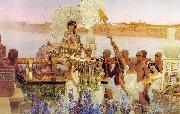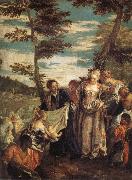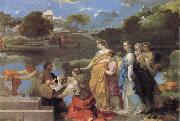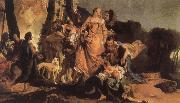
Oil On
Canvas, Real Flavor of Old Masters
|
Alma Tadema
|
|||
|
|
|||
|
|
|||
|
|
The Finding of Moses Alma Tadema13.jpg Painting ID:: 191 Visit European Gallery |
1904 | |
Height Width |
INS/CM |
||
|
X |
|
||
|
|
|||
|
Paolo Veronese
|
|||
|
|
|||
| Italian Mannerist Painter, ca.1528-1588 Italian painter and draughtsman. With Titian and Tintoretto he makes up the triumvirate of great painters of the late Renaissance in Venice. He is known as a supreme colourist and for his illusionistic decorations in both fresco and oil. His large paintings of biblical feasts executed for the refectories of monasteries in Venice and Verona are especially celebrated. He also produced many altarpieces, history and mythological paintings and portraits. His compositional sketches in pen, ink and wash, figure studies in chalk, and chiaroscuro modelli and ricordi form a significant body of drawings. | |||
|
|
|||
|
|
The Finding of Moses new9/Paolo Veronese-456579.jpg Painting ID:: 33507 Visit European Gallery |
mk86 c.1570-1575 Oil on canvas 50x43cm Madrid,Museo del Prado | |
Height Width |
INS/CM |
||
|
X |
|
||
|
|
|||
|
Bourdon, Sebastien
|
|||
|
|
|||
| French, 1616-1671.French painter. Bourdon was active in Rome (1634 C37), in Sweden (1652 C54) as Queen Christina's court portrait painter, and in Paris; he also worked in his native Montpellier, where he painted The Fall of Simon Magus for the cathedral. The Finding of Moses is in the National Gallery of Art, Washington, D.C. | |||
|
|
|||
|
|
The Finding of Moses new9/Bourdon, Sebastien-736628.jpg Painting ID:: 33609 Visit European Gallery |
mk86 c.1650 Oil on canvas 119.6x172.8cm Washington,National Gallery of Art | |
Height Width |
INS/CM |
||
|
X |
|
||
|
|
|||
|
Giovanni Battista Tiepolo
|
|||
|
|
|||
| Italian Rococo Era Painter, 1696-1770 Giovanni Battista Tiepolo was born in Venice on March 5, 1696. His father, who was part owner of a ship, died when Tiepolo was scarcely a year old, but the family was left in comfortable circumstances. As a youth, he was apprenticed to Gregorio Lazzarini, a mediocre but fashionable painter known for his elaborately theatrical, rather grandiose compositions. Tiepolo soon evolved a more spirited style of his own. By the time he was 20, he had exhibited his work independently, and won plaudits, at an exhibition held at the church of S. Rocco. The next year he became a member of the Fraglia, or painters guild. In 1719 he married Cecilia Guardi, whose brother Francesco was to become famous as a painter of the Venetian scene. They had nine children, among them Giovanni Domenico and Lorenzo Baldassare, who were also painters. In the 1720s Tiepolo carried out many large-scale commissions on the northern Italian mainland. Of these the most important is the cycle of Old Testament scenes done for the patriarch of Aquileia, Daniele Dolfin, in the new Archbishop Palace at Udine. Here Tiepolo abandoned the dark hues that had characterized his early style and turned instead to the bright, sparkling colors that were to make him famous. | |||
|
|
|||
|
|
The Finding of Moses new16/Giovanni Battista Tiepolo-273834.jpg Painting ID:: 40544 Visit European Gallery |
mk156 1730 Oil on canvas 202x342cm | |
Height Width |
INS/CM |
||
|
X |
|
||
|
|
|||










